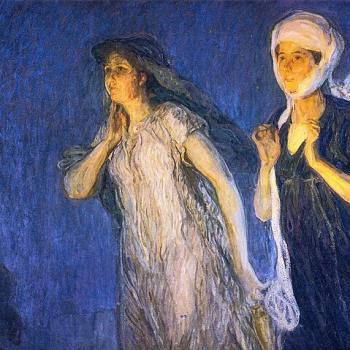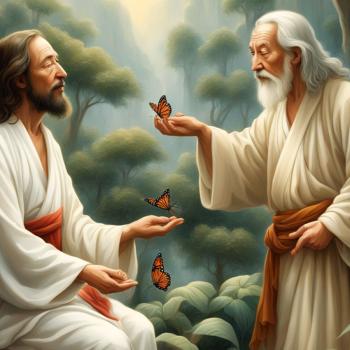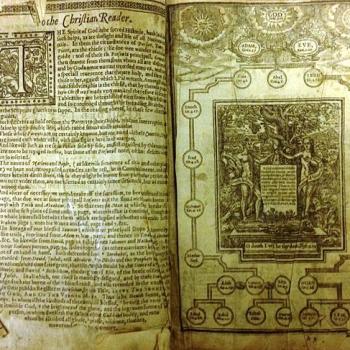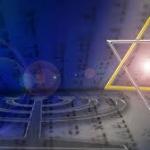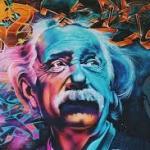 (This week’s article is by guest author Gregory Gronbacher. A brief bio on Gregory, is provided below.)
(This week’s article is by guest author Gregory Gronbacher. A brief bio on Gregory, is provided below.)
A quick glance at recent Pew Foundation surveys on Judaism reveal that many Jews – as many as 60% of American Jews – identify as atheist or agnostic. Jewish views on God have always varied and the tradition avoids definitive explanations of the nature of the divine.
There has always been much less emphasis on the supernatural in Judaism than in Christianity which sprang from it. There is more supernaturalism in the much shorter Christian New Testament than in the much longer Hebrew Bible.
Modern and contemporary Judaism leans rational, logical and moral. It is not creedal, but rather emphasizes moral living, social justice, and religious practice – it is less a theology and more a way of life. In Judaism, beliefs as such are only significant if they serve as a means to foster goodness and wholeness. Given such, there are significant movements and groups within Judaism rooted in humanist, naturalist, and non-theist thought.
The small Jewish denomination called Humanistic Judaism, started by Rabbi Sherwin Wine is explicitly non-theist. Another denomination, Reconstructing Judaism, takes its primary inspiration from the thought and theology of Mordecai Kaplan, a twentieth century Jewish thinker, who promoted a naturalist understanding of God and reinterpreted or “reconstructed” Judaism accordingly. Reform Judaism is highly tolerant of naturalist approaches as well, and such views are reflected in its Siddur, or prayer book, Mishkan T’filah.
Let’s briefly consider the work of two American Jewish thinkers who provided foundations for naturalist thought within contemporary Judaism – Mordecai Kaplan and Arthur Green.
According to Mordecai Kaplan (1881-1983), God is not a person, but rather a power through which salvation, understood as wholeness, is possible. He argues that God is the metaphor for the sum of animating, organizing forces and relationships which are forever making a cosmos out of chaos. As such God is the creative life of the universe.
The entirety of Kaplan’s theology is commentary on the basic idea that God is the power that creates or allows for salvation – the collection of creative, life-giving, human-enhancing powers, values, and aspirations that lead to human thriving and wholeness.
Rabbi Arthur Green (1941 – ) is a liberal Jewish thinker, professor, author, former seminary leader and teacher of two generations of American rabbis and scholars. He’s known for his work in forming Neo-Hasidism.
Green, in his various published works, seeks to outline a Jewish theology that is still viable after the two great intellectual defeats of traditional religion in the twentieth century: the triumph of evolutionary biology (and with it a host of other sciences, including astrophysics and geology, in describing the origin of our planet and the emergence of life upon it) over traditional views of creation, and the wide acceptance of forms of biblical criticism and modern scholarship, with its challenges to the divine and mosaic authorship of the Torah.
For Green, the intellectual foundations for renewing Jewish theology must be found in mystical forms of religious naturalism, that entail no literal belief in a deity that is willful or active in human affairs. Such views also consider Torah a human product. Still, Green advocates for a naturalism deeply tempered by a sense of the transcendent, an openness to the existential issues of inner experience, and a humility about the limits of human knowledge.
Where does this leave Mitzvot?
Thought, belief, and action cannot be artificially separated, they motivate and reinforce one another. Still, Judaism has leaned toward orthopraxy over orthodoxy. And at the heart of this emphasis on action and practice resides the Jewish concept of mitzvah.
Mitzvah literally means commandment. Mitzvot are commandments, traditionally understood to come from God, intended for the Jewish people to observe. They provide much of Jewish identity and practice. They shape Jewish life, celebrations, holidays, and life events. Jewish tradition has settled on 613 mitzvot (plural of mitzvah) as derived from Torah.
The notion of mitzvot, a commandment, necessarily implies a commander. The Tanakh and Jewish tradition understand God as the commander who gave the Jews the mitzvot at Sinai, where the Israelites responded, “naaseh v’nishma,” We will do and we will hear – commonly translated as, “All that the Eternal has spoken we will faithfully do.” (Exodus 24:7).
As modern Judaism continues to drift in various naturalist directions, a central question arises – who commands? What or who’s voice, if any, is behind the commandments? Many contemporary Jewish thinkers have considered this question, notably Kaplan, Green, and Reform theologian Eugene Borowitz.
For the sake of brevity, I’m not going to engage in a full blow philosophical analysis of this question. Rather, I’m going to lay out introductory ideas that indicate a direction to take, a way forward to ponder and think through. This way forward contains at least four interconnected notions that color our discussion.
First, Kaplan and Green and others working within a naturalist framework do not completely abandon the notion of God. Yes, they move away from claims of a personal deity and toward metaphors and more abstract concepts of the divine. Still, such metaphors and concepts serve as something of an orientation. They represent humanities highest vision for morality, human nature, and a just, caring, and humane social order. Such a vision and orientation can motivate and guide human behavior. The Eternal that places demands need not be personal, even if metaphorically treated as such.
Second, Jewish tradition lays out a fairly clear moral vision and set of expectations for human behavior. Yes, the tradition has evolved from earlier Iron Age notions of patriarchy, violence, blood sacrifice, outdated views of sexuality and gender, and so on. At the core of the tradition is love, compassion, justice, service, generosity, concern for the marginalized, oppressed, ill, and needy. If one identifies as Jewish and engages that identity, the tradition presents demands and places obligations on them.
Third, traditions don’t exist in abstract idealized forms – they are embodied in a people, in various communities, in congregations, groups, and associations. To be part of any Jewish community or organization is to accept a set of expectations, responsibilities, and obligations.
Fourth, and finally, human nature itself makes demands on our behavior and calls us toward certain values and ideals. To reflect on human dignity is a gateway to moral understanding and the assertion of human rights and responsibilities that form our social order. Our dignity makes certain demands on us in terms of how we live, eat, dress, work, have sex, entertain ourselves – and how we relate to others, both humans and nonhumans, in the world around us.
Humans experience the capacity of being “called” by something beyond ourselves, something that both speaks to our nature and is yet embedded there. In moments of quiet honesty, we find ourselves with a given orientation – and that orientation offers itself up as an approach to our better selves – it is the voice of our own nature calling us toward fulfillment.
Therefore, from a naturalist perspective, the commandments and our general sense of morality is not imposed on humanity or revealed by a deity or religious authority. Rather it is an integral part of our natural identity. Our moral responsibilities and rights arise from our nature (a reasoned teleological reflection on such) and our relationship to others. This vision offers a formal framework within which to conduct moral reasoning. Our motivation for virtue is a matter of our own integrity, following the logic of our very being.
Subscribe to The Spiritual Naturalist Society
Learn about Membership in the Spiritual Naturalist Society
__________
The Spiritual Naturalist Society works to spread awareness of spiritual naturalism as a way of life, develop its thought and practice, and help bring together like-minded practitioners in fellowship.
Bio:




